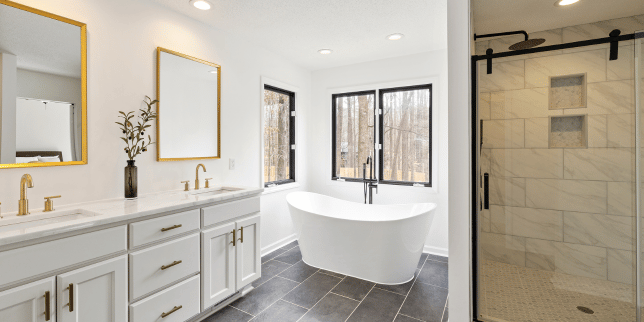8 Red Flags of a Bad Home Remodeling Contractor
March 15th, 2023
5 min read

Remodeling your home is an exciting endeavor, but it can quickly become distressing if you choose a bad contractor.
Unfortunately, not all contractors are equally experienced or skilled, and some may even do more harm than good. That's why it's crucial to keep an eye out for red flags when hiring a home remodeling contractor.
As a remodeler with 20+ years of experience managing and constructing projects, we value not only creating beautiful and functional spaces but also making sure your construction experience is as positive as possible.
In this article, you’ll become familiar with eight warning signs that indicate you may have hired or are about to hire a bad contractor:
-
There Are No Lien Waivers Between the Contractor, Subcontractors, and Material Vendors
-
The Contractor Won’t Provide Their License and Insurance Information
-
The Contractor Asks You to Obtain Building Permits in Your Name
-
Construction Begins Before the Design and Material Selections Are Finalized
1. The Contractor’s Remodeling Process Has No Clear Next Steps

When embarking on a home remodeling project, clear communication with your contractor from start to finish is key. It ensures that everything runs smoothly.
A common issue you may encounter when hiring a contractor is the lack of clear steps about what comes next in their remodeling process.
As an example, when you initially reach out to a contractor for a project quote, they should give you a clear expectation of when you’ll receive the quote back. If a straightforward timeline isn’t communicated up front, you may want to proceed with caution.
Clear communication is crucial to a positive and successful home renovation. If the contractor doesn’t provide clear next steps at the beginning of the project, the rest is not likely to be any different.
Poor communication with no clear direction is a red flag.
2. There Are No Lien Waivers Between the Contractor, Subcontractors, and Material Vendors

When you hire a contractor for a home remodeling project, you appropriately expect them to manage all the details, including hiring and paying subcontractors and vendors.
However, a red flag to watch out for is your contractor not getting lien waivers from their subcontractors and material vendors.
A lien waiver is a legal document that releases a subcontractor's or vendor’s right to place a lien on your property in exchange for payment.
Without a lien waiver, you could be at risk of having a lien placed on your property if the contractor fails to pay their subcontractors or vendors after working on your project.
A reputable contractor will have no problem providing you with lien waivers for their subcontractors and vendors, as this is a standard practice in the construction industry.
3. The Payment Process is Unclear

A payment process should be well-defined and transparent, leaving no room for ambiguity or confusion.
If the contractor you are working with does not have a clear payment process, it could be a sign of unprofessionalism, and it could lead to issues such as disputes and delays in your project's completion.
A good contractor will provide you with a detailed payment schedule that outlines the payment amounts and due dates during each phase of the project. This allows you to budget accordingly and avoid any surprises.
To avoid this red flag, it is essential to ask the contractor about their payment process before starting any work.
The contractor should be able to provide you with a clear and detailed payment schedule and explain how they handle additional costs or changes in the project scope.
4. The Remodeling Contract is Nonspecific or Lacks Details

A remodeling contract outlines the scope of your project, the materials to be used, the timeline, and the payment schedule, among other essential details.
However, a contractor who provides you with a vague and nonspecific contract is probably not organized and may not have your best interests at heart. A nonspecific contract that leaves room for ambiguity and potential disputes during the project's course is a red flag when hiring a contractor.
A good contract should include detailed information about the work to be done, including specific materials, and should outline the project's timeline.
It should also include a detailed payment schedule and procedures for handling changes to your project's scope or budget.
A professional contractor will be willing to work with you to create a specific and detailed contract that meets your needs and protects your interests.
5. The Contractor Won’t Provide Their License and Insurance Information

A contractor's license and insurance protect both the contractor and the homeowner from potential risks and liabilities. However, if a contractor is hesitant to provide you with their license and insurance information, it’s a red flag that they may not be qualified or trustworthy.
You can verify a contractor’s license and licensing requirements with the state of Michigan through the Department of Licensing and Regulatory Affairs.
A building license is a legal requirement for a contractor to hold in most states, and it is also an indication of their professionalism and commitment to their craft.
Liability insurance protects both the contractor and the homeowner from potential accidents or damages that may occur during the project.
To avoid this red flag, it is important to ask the contractor for their license and insurance information before starting any work with them.
6. The Contractor Asks You to Obtain Building Permits in Your Name

Pulling your own permit and hiring a contractor to do the work for you is illegal.
You become liable for any issues that arise during the project. In Michigan, the person or company who pulls the permit is legally required to perform the work.
Remember: You're not the project manager. The contractor you hire should pull all permits in their company’s name.
A contractor who asks you to pull permits in your name either doesn’t have a license, has a suspended license, or can’t appear in front of the building department for some other reason.
This is a major red flag that you should be aware of and avoid at all costs.
7. You Are Required to Pay for the Entire Project Upfront

While it's common to pay a deposit upfront or in installments, paying for the entire project before construction begins is a major red flag.
Paying for the entire project upfront before construction begins leaves you at the mercy of the contractor. If they fail to deliver the work as promised, it can be challenging to recover your money.
Additionally, a contractor who demands payment upfront may not have enough financial resources to start the project. It could be a sign that they are struggling financially or that they are not reputable.
It's best to work out a payment schedule with your contractor that reflects the project's scope and timeline. A typical payment structure involves a deposit upfront, with payments made at various stages of the project's completion.
This approach helps to ensure that the contractor is incentivized to complete the work to your satisfaction and that you have some leverage to hold them accountable.
8. Construction Begins Before the Design and Material Selections Are Finalized

Before construction begins, it is essential to have a clear design plan, as well as finalized material selections.
However, if a contractor is pushing to begin construction before the design and material selections are finalized, it could be a red flag.
Starting construction before the design and material selections are finalized can lead to significant issues, including change orders, delays, and increased costs. If a contractor does not have design plans or selections finalized before beginning work, they will have to keep adjusting the project’s plan and budget to match changes as they are made
To avoid this red flag, it's important to work with a contractor who is willing to wait until the design and material selections are finalized before beginning construction.
Ask the contractor what their design process looks like to verify that construction won’t begin until these important details are planned and accounted for.
Next Steps to Finding the Right Home Remodeling Contractor
Embarking on a home remodeling project is an exciting prospect, but the wrong contractor can quickly turn it into an ordeal.
It's important to be aware of potential red flags when choosing a contractor to avoid distressing issues during your project.
As a professional remodeler with over 20 years of industry experience, we value not only creating beautiful and functional spaces but also ensuring that our clients have a positive construction experience.
Becoming familiar with potential red flags when hiring a contractor will help you choose a good one and have the best remodeling experience available to you.
To learn about Custom Built’s remodeling services and to see if we’re the right remodeling contractor for you, reach out to one of our project development advisors. They’d be happy to discuss your project with you.
To learn more about finding the right remodeling contractor for your project, read the following articles:
Michael brings over 2 decades of building and remodeling experience to his position as the Owner and Visionary of Custom Built. Michael’s passion to make an impact on the home building industry has led him to serve for over ten years at the local and state Home Builders Association, culminating as President of the HBA of Michigan in 2020.


























